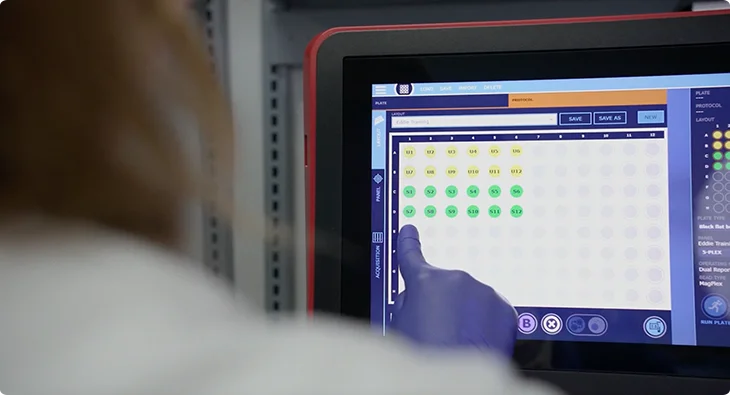2022 in Review: A Sampling of xMAP® Publications We Loved
Demonstrations of multiplexing technology in research applications including cancer, infectious diseases, the microbiome, and more
There aren’t many high-throughput life science technologies that have as long a track record as our multiplexing Tracking customer publications is one of our favorite ways to keep informed of the many creative ways in which scientists apply our technology. As we kick off 2023, we thought it worth revisiting some of the highlights from last year’s publications. Out of some 4,000 papers that appeared throughout January-September 2022 citing xMAP Technology, we chose a small selection to represent the broad range of applications where multiplexing assays are making a difference.
Research Area: Cancer
Title: Paclitaxel liposome for injection (Lipusu) plus cisplatin versus gemcitabine plus cisplatin in the first-line treatment of locally advanced or metastatic lung squamous cell carcinoma: A multicenter, randomized, open-label, parallel controlled clinical study
Citation: Zhang J, et al., Cancer Commun, Jan 2022, 42(1):3-16. DOI: 10.1002/cac2.12225
In this paper, researchers conducted a multicenter, randomized, phase 3 study to compare standard treatment for locally advanced lung squamous cell carcinoma to a newer therapy. Analysis of cytokine levels with xMAP Technology showed that a certain cytokine signature was linked to improved response and progression-free survival with the new treatment.
Research Area: Chemokines & Cytokines
Title: Neonatal chemokine markers predict subsequent diagnosis of autism spectrum disorder and delayed development
Citation: Kim D, et al., Brain Behav Immun, 2022, 100:121–133. DOI: 10.1016/j.bbi.2021.11.009
Researchers used xMAP Technology to analyze cytokine and chemokine patterns from neonatal blood spots in order to stratify children with typical development, delayed development, and autism spectrum disorder. They found that dysregulation of chemokines at a young age can impede development and lead to an autism diagnosis. The team also identified certain chemokines that may be associated with autism and could ultimately assist with diagnosis.
Research Area: Microbiome
Title: Zinc is a key regulator of gastrointestinal development, microbiota composition and inflammation with relevance for autism spectrum disorders
Citation: Sauer AK, et al. Cell Mol Life Sci, 2022, 79:46, DOI: 10.1007/s00018-021-04052-w
Using 3D intestinal organoids grown under specific conditions to model gastrointestinal development, scientists showed that zinc depletion has a substantial impact on GI development and the microbiome composition. The study has implications for zinc deficiency in pregnancy and related disorders, such as “leaky gut” and autism.
Research Area: Childhood Obesity
Title: Multiplexed measurements of salivary fetuin-A, insulin, and adiponectin as potential non-invasive biomarkers in childhood obesity
citation: Selvaraju, A, et al. Cytokine, 2022, 153:155843. DOI: 10.1016/j.cyto.2022.155843
Researchers conducting a study of childhood obesity collected saliva samples from 76 participants. They used xMAP Technology to measure salivary markers such as fetuin-A, insulin, and adiponectin, and found that fetuin-A and insulin were increased, and adiponectin was decreased in obese children. With further study, these markers could help predict a child’s risk of developing obesity early enough for intervention.
Research Area: Dengue Fever
Title: Peptide Biomarkers for the Diagnosis of Dengue Infection
Citation: Falconi-Agapito F, et al. Frontiers in Immunol, January 2022, 13: 793882, DOI: 10.3389/fimmu.2022.793882
Scientists developed an xMAP-based immunoassay for 20 peptides associated with dengue virus infection and evaluated it with hundreds of human samples to determine its utility. They found that analysis of six peptides led to improved sensitivity for viral detection.
Research Area: Tuberculosis
Title: Defining Discriminatory Antibody Fingerprints in Active and Latent Tuberculosis
Citation: Nziza N, et al. Frontiers in Immunol, April 2022, 13:856906, DOI: 10.3389/fimmu.2022.856906
Researchers used xMAP Technology for a study designed to distinguish between active and latent cases of tuberculosis in patients with and without HIV co-infection. They measured humoral immune response in adults with TB and identified a set of antigen-specific antibody profiles associated with both stages of the infection.
Research Area: COVID-19
Title: Simultaneous Measurement of IgM and IgG Antibodies to SARS-CoV-2 Spike, RBD, and Nucleocapsid Multiplexed in a Single Assay on the xMAP INTELLIFLEX® DR-SE Flow Analyzer
Citation: Cameron A, et al. Microbiol Spectr March/April 2022, 10(2), DOI: 10.1128/spectrum.02507-21
Researchers modified a serological assay for SARS-CoV-2 infection to run on the new 
You can browse even more publications citing xMAP Technology on our publications portal.

